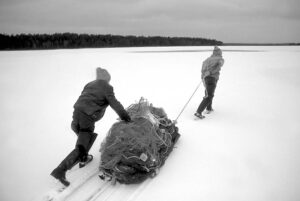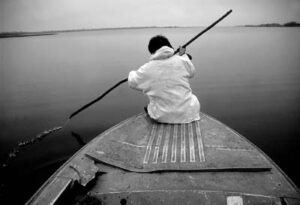Sitting cross-legged on a hand-hewn, wooden sled I am wondering how I can coax a little more speed out of the two reindeer trudging before me. Up ahead, Alexei is growing smaller and to the rear Misha is rapidly catching up. They were smart in positioning me—a novice reindeer driver—in the middle.
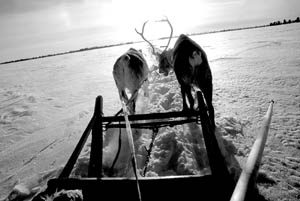
I could deliver solid raps to the rumps of my team with the long pole I am carrying, just as Alexei and Misha do. But I can’t seem to bring myself to inflict such pain on these noble animals. Finally, after some experimentation, I learn that half-hearted jabs with the pole work well when combined with an occasional loud “Schweett” sound. Feeling self-congratulatory as we pull to a stop, I notice that my deer are quick to lie down while the two other teams stand placidly beside their sleds. I accuse Misha of giving me animals of questionable strength. “No,” he explains matter-of-factly. “Americans are just heavier than Khanties.”
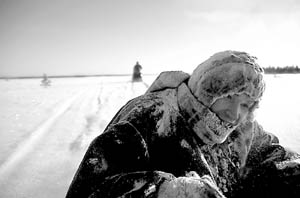
When not fretting about keeping up the pace, I have time to relish the fact that I am 12 time zones—half a world—away from home driving my own reindeer sled across the desolate yet beautiful Siberian taiga. No matter that the temperature is minus 25 degrees Celsius, or that this terrain is so remote the appearance of a jetliner high in the sky is cause for my friends to stop and ponder. I am lucky, I think, to be here observing and participating in a way of life that dates back a multitude of centuries, and one which is still principally subsistent on the surrounding natural environment. Despite the rapid globalization of the world community over the past dozen years, here is a people to which ethnic disputes in the Balkans, trade wars in the Pacific Rim, and the latest whims of Bill Gates matter little.
Although there is no paperwork bearing witness of his birth, Alexei Moldanov believes he is about 70 years old. That makes him old enough to remember the traditional ways of his people, the Khanty (pronounced han-tee). He was born and raised in this isolated corner of Russia, in the Beloyarski district of the Khanty-Mansiysk region to be exact. And, except for service in the Russian army, he has spent all of his life here. Certainly, he knows well how to exact a living from the surrounding forests, rivers, marshes, and lakes. And he knows reindeer inside and out.
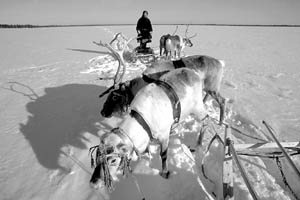
As one of 23 indigenous groups in Asiatic Russia, the Khanty have lived in this remote corner of northwestern Siberia for thousands of years as hunters, fishermen, and the herders of reindeer. Their subsistence culture weathered the arrival of Cossack explorers and traders in the 1600’s and, within the twentieth century, it has endured several decades of Soviet rule. Alexei, himself, remembers when the Soviet regime under Stalin declared his father’s reindeer to be property of the state. And his wife, Ducia, can recount the years her father served in a Tobol’sk gulag for the crime of being a shaman.
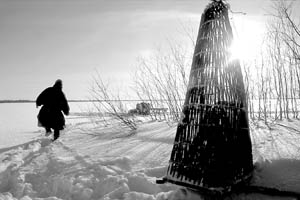
Despite having survived heavy-handed treatment by outside forces, the Khanty now face a threat far more ominous than the dictates of autocratic rule. That is because their homeland straddles one of the largest oil deposits in the world. In the ensuing frenzy to develop this energy reserve, vast tracts of traditional Khanty land have been laid to waste. Oil spills have polluted pristine wetlands, derrick fires have produced acid rain, roadways have caused flooding, wildlife has been severely disrupted, and Khanty families have lost their ancestral territories. As a result, their subsistence lifestyle is rapidly vanishing. In so many ways this scenario—one which pits an indigenous culture against unchecked resource development—is one that has played out numerous times in this country not so ago.
Benefiting from the fact that they live more than 100 kilometers from the nearest city, and that the surrounding labyrinth of rivers, lakes, and marshes can only be breached in the summertime by helicopter, Alexei and Ducia count themselves lucky. They know of the destruction that has taken place in and around such places as Surgut, Neftugansk, and Nizhnevartovsk. They have seen other Khanties lose their traditional homelands to the oil companies through coercion, intimidation, forgery, and outright bribery. And they have seen many of their people slip into lives of alcoholism and meaningless existence.
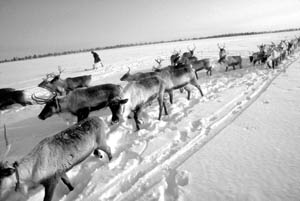
I have traveled to the Moldanov reindeer camp to learn more about the traditional world of the Khanty and to document it before it slips away. My guide is my good friend, Misha, the youngest son of Alexei and Ducia. Normally, it is an hour-and-a-half flight by helicopter from the village of Kazym, my homebase in Siberia. It being mid-February, however, we instead drove by taxi on a winter road and then rode the last 60 kilometers in on snowmobile. Whereas the sub-zero temperatures of the Siberian winter are tolerable with no wind and plenty of bright Arctic sun, the wind-chill factor makes for a memorably cold ride on the Russian-built snow machine.
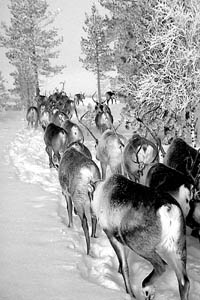
Lacking contact with the outside world, Alexei and Ducia had no more than a few minutes notice of our arrival. Before I was even off of the snowmobile, however, Alexei greets me with a strong hug and a kiss on either cheek. Having grabbed an arm-load of firewood to boil water for tea at the first sound of our snowmobile, Ducia soon emerges from the small cabin to similarly greet us.
Measuring 20 by 20 feet, the Moldanov’s winter cabin is cozy and warm. A low table sits in front of the structure’s only window. A small rectangular stove occupies one corner of the room. The entire back wall is lined by a slightly elevated platform which serves as a sleeping area. Several reindeer pelts spread across it provide both padding and warmth. Clothes and other household items hang throughout the room from wires and nails. Displayed on a shelf in the back right corner is a bear’s head. With colorful beaded necklaces draped around it and coins placed in its eye sockets, this small altar is the cornerstone of traditional Khanty belief. Because bears are spiritually powerful animals for the Khanty, bear heads are found in the same corner of every Khanty home.
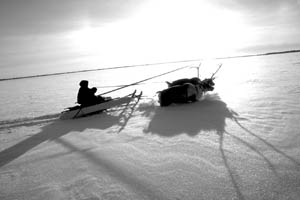
Of course, the first order of business in any Siberian home, especially in the winter, is to serve hot tea and a meal. For this auspicious occasion, the meal consists primarily of raw reindeer meat. From a cache outside, Ducia produces part of a frozen leg quarter and some ribs which she then chops with an ax into more manageable pieces. A string of knives is passed around and we help ourselves to slices of this Khanty delicacy. Not particularly fond of raw meat, I eat with just enough gusto so as not to offend my hosts. And I wait with anticipation until Ducia sets a pot of boiled meat on the table, which serves as the meal’s second course.
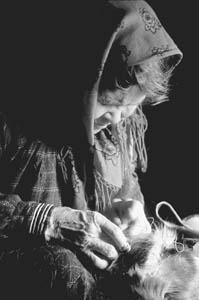
After dinner we talk by the soft glow of an old kerosene lantern. Whereas my command of the Russian language is enough to get by back in Kazym, here I am completely reliant on Misha’s translations. His parents prefer to speak Khanty, as does Misha. When I give Ducia a snapshot of my family, she and Alexei light up. And, when I tell them I have spent so much time in Kazym that I consider it to be my second home, Alexei responds, “Now you have three homes.” The ease with which they accept me into their lives is overwhelming. At this point our relationship becomes one that is as personal as it is professional.
The next morning Alexei straps on some oversized, handmade wooden skis and heads beyond the pole corral towards the east to fetch his reindeer. I have brought along an expedition-grade down parka and the warmest Goretex-lined boots I could find. Misha insists, however, that I wear a large anorak-styled parka made of reindeer skin and hip-length reindeer skin boots. They are warm, he promises, and the deer might think I am a Russian if I am dressed in western clothes. “They will be afraid of you,” he says flatly.
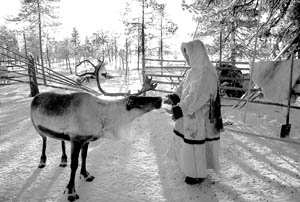
After an hour, the first animals began to trickle in. Ducia herds straying deer towards the corral as I hang back so as not to block their way. Despite my disguise, they know I am a newcomer to the camp and they eye me with suspicion. Trailing behind the last of them comes Alexei with a dead red fox draped over his shoulders. Having been caught in a steel trap, the small red canine will be skinned later and its pelt will become a hat.
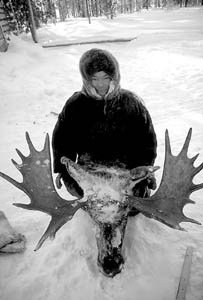
After the mid-morning meal, Alexei and Misha lasso six deer and hitch them up in pairs to three of the dozen or so wooden sleds sitting about the compound. Misha gives me some instruction on how to manage the deer and then we are off. Reindeer mushing being a far more benign activity than I had imagined, my only problem seems to be keeping pace with the Moldanovs.
After crossing a large frozen lake, we stop at the place where the outflowing stream snakes its way north towards the Arctic Ocean and begin chipping a hole through the ice. It is nearly a meter thick thanks to minus 60 degree temperatures the month before. After much sweat and toil, we pull a large, conical-shaped fish trap out to find just three small fish. A far more disappointing catch than they are used to, Misha explains that the thick ice has impeded the fish from their normal migrations in the stream beneath. I ask about the deer in such extreme cold. “They like it,” Misha says.
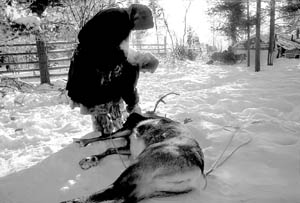
Back at camp the teams are turned loose and the entire herd soon heads back out to graze for the evening. We retire to the cabin for tea and a meal. Afterwards Misha and I work at getting an ancient chainsaw running which, after countless yanks on the starter cord and many adjustments of the fuel mixture screw, finally sputters to life. Misha admits to being totally inept at mechanical work. It is a deficit he more than makes up for with his command of forest lore.
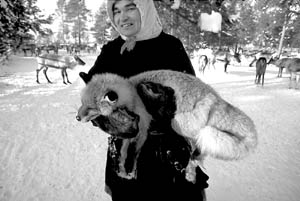
The next morning Misha and I strap on skis to go fetch the deer. After traversing meadows and small glades of birch, we come to an expansive opening across which the reindeer are widely scattered. This is an ideal grazing area when the snow is deep, Misha explains, because the winter winds tend to blow some of the snow away. The area is potmarked with holes in the snow where the deer have pawed their way down to solid ground and patches of tasty lichen below.
Misha goes on to explain that this grazing area is why their winter home is located here. The cabin is situated in a protective forest but the deer have a good place to feed nearby. In early May, Alexei and Ducia move to their spring home where a lack of trees makes it easy to keep track of calving. After all of the newborns are delivered they then move a few kilometers south to their summer home. Given the intense swarms of mosquitoes in June and July, this small cabin (measuring no more than 15 by 15 feet) is strategically situated next to a lake where any breeze has the best chance of picking up enough velocity to drive the insects away. Once the mosquitoes are gone for the year it is then on to their autumn home five kilometers to the south. With a multitude of berries growing nearby and streams teaming with fish, it is a good place to put away stores for the winter. Finally, with the onset of winter in late October it is then back to this, their winter home.
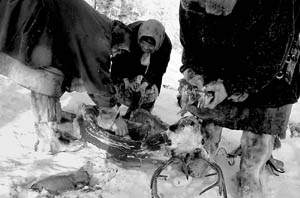
Standing in the midst of the widely scattered herd, Misha begins to sing loudly in Khanty. At first a few deer look up but before long they begin grouping together. This being their cue to head home, they eventually start to trail the three kilometers home. Following the herd in, I look over at Misha who skis along the right rear flank of the herd. I can’t help but marvel at the venerable scene. He is wearing his traditional Khanty parka and boots and sliding along on ancient skis. This is the way it has been for as long as the Khanty have been raising reindeer, I think. Later, back at camp, I ask Misha why the deer were so eager to return to camp. “We feed them frozen fish,” he says. “They really like it.”
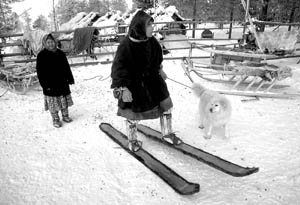
After tea, Alexei and Misha get out their lassoes and rope a single deer which Alexei has selected beforehand. Once captured, they pull her outside of the corral where Misha and I hold onto tightly stretched lead ropes. Ducia produces an ax, a bottle of vodka, cups, and other items from a cache nearby and Alexei ignites some moss in a tin can to produce smoke.
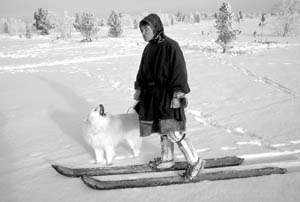
Passing the smoking can over and beneath the deer, Alexei recites a few lines in Khanty and then, with one mercifully quick blow of the ax to the back of the deer’s head, the animal lays motionless on the snow. Alexei and Misha chant a few short lines towards the sky and complete 360-degree clockwise rotations. The lassoes are removed and one is tossed over a nearby birch. After the first blood is drained from the still warm body, a cup of the thick red liquid is poured over a pine tree. The desired effect of these ceremonial motions is to bring life into harmony with nature. The deer’s spirit, it is believed, will go on to appease the pantheon of Khanty gods and goddesses.
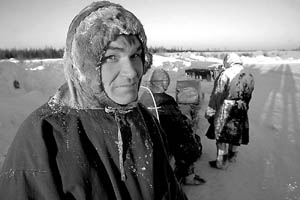
Of course, the deer’s sacrifice serves a practical role as well. Armed with a small arsenal of sharp knives, the three of them begin butchering the deer with deft ability. First, every square inch of the pelt is removed and hung to dry over the corral fence. Eventually it will serve some useful purpose, as bedding or clothing perhaps. All of the blood is saved as is nearly every organ pulled from the abdominal cavity. Large sections of meat are then quartered and stashed beyond the reach of the camp dogs.
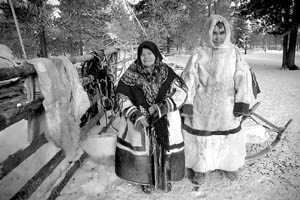
As they move quickly through their task, I marvel at the bright red that covers the carcass, their hands, and the surrounding snow. At first the scene seems barbaric to my western ethic. But then it occurs to me that this is far more humane than the large slaughter houses which produce the meat I buy back home. As consumers of meat, the Moldanovs know full well where their meals come from. In a spiritual context, the deer’s sacrifice serves to benefit the well being of all people. Additionally, nothing is wasted in this little camp in the vast Siberian wilderness.
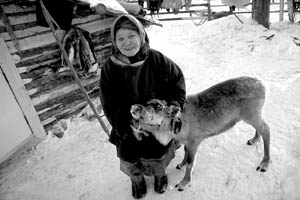
Immediately following the butchering of the deer we sit down to a grand meal of, what else, raw reindeer meat. Still warm and unfrozen, the meat is harder to enjoy than the frozen slices I had two days before. When the boiled portion of the meal finally reaches the table I find an astonishing array of cooked body parts: intestinal components, various organs, brain, tongue and such. Acting interested in it all I nibble on a few of the less daunting pieces until I come across a large piece of cooked liver. Buoyed by the fact that the others are only interested in the more exotic offerings of the stew pot, I enjoy this find immensely.
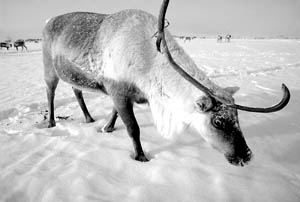
That evening–my last with the Moldanovs–we talk more about the time of Soviet rule. Having worked for a state-owned reindeer camp, or brigade, for many years, Alexei recalls the difficulty he had in knowing that the deer he was working were once his father’s. I ask if things are better now. He says “yes.” While he acknowledges the economic crisis which grips Russia, he sees a silver lining. Because of a lack of money, he reasons, there are far fewer Russians in his corner of the world hunting and fishing. And, for the time being anyway, the oil companies do not have the financial fortitude to cast their gaze this far out. As for his own economic well-being, because virtually everything he and Ducia need can be found right here in the surrounding taiga lands, he has little use for cash.
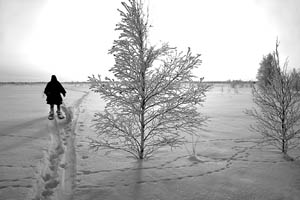
©2000 Scott S. Warren
Scott Warren, a photographer based in Durango, CO., is examining the life of the Khanty of northwestern Siberia.

